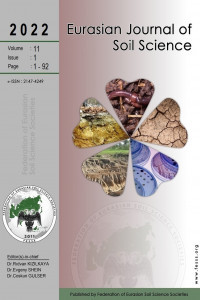Assessment of the potential mobility of copper in contaminated soil samples by column leaching test
Contaminated soil, copper, column experiment, dissolved organic carbon,
___
- Adriano, D.C.,1986. Trace elements in the terrestrial environment. Springer-Verlag, New York. USA. 533p.
- Benhabib, K., Simonnot, M.O., Faure, P., Sardin, M., 2017. Evidence of colloidal transport of PAHs during column experiments filled with contaminated soil samples. Environmental Science and Pollution Research International 24(10): 9220–9228.
- Cappuyns, V., Swennen, R., 2008. The use of leaching tests to study the potential mobilization of heavy metals from soils and sediments: A comparison. Water Air Soil Pollution 191(1-4): 95-111.
- CCME, 2007. Canadian Council of Ministers of the Environment. Canadian Soil Quality Guidelines for the - Protection of Environmental and Human Health, Summary Tables, Update 7.0.
- Dameron, C., Howe, P.D., 1998. Copper Environmental Health criteria n°200, World Health Organization. Geneva.
- De Jonge, L.W., Moldrup, P., De Jonge, H., Celis, R., 2008. Sorption and leaching of shortterm-aged PAHs in eight European soils: Link to physicochemical properties and leaching of dissolved organic carbon. Soil Science 173(1): 13-24.
- Di Palma, L., Ferrantelli, P., Merli, C., Petrucci, E., Pitzolu, I., 2007. Influence of soil organic matter on copper extraction from contaminated soil. Soil and Sediment Contamination : An International Journal 16(3): 323–335.
- Duchaufour, P., 1997. Abrégé de pédologie : Sol, Végétation, Environnement. 5ème Ed. Paris, France.
- ISO 23470. 2007. Soil quality, Determination of effective cation exchange capacity (CEC) and exchangeable cations using a hexamminecobalt trichloride solution.
- ISO 11466. 1995. Soil quality, Extraction of trace elements soluble in aqua regia.
- Jalali, M., Khanlari, Z.V., 2008. Effect of aging process on the fractionation of heavy metals in some calcareous soils of Iran. Geoderma 143(1-2): 26-40.
- Kadari, H., Benhabib, K., Taleb, S., 2015. Evaluation of organic pollution from leaching water of industrial wasteland: A case study for Kenadsa region (Algerian South West). Journal of Materials and Environmental Science 6(7): 1885-1889.
- Kalbe, U., Berger, W., Eckardt, J., Simon F.G., 2008. Evaluation of leaching and extraction procedures for soil and waste. Waste Management 28(6): 1027-1038.
- Mathieu, C ., Pieltain, F., 2003. Analyse chimique des sols-Méthodes choisies. Lavoisier, France. 388p.
- McBride, M., Sauve, S., Hendershot, W., 1997. Solubility control of Cu, Zn, Cd and Pb in contaminated soils. European Journal of Soil Science 48(2): 337-346.
- Mileusnić, M., Mapani, B.S., Kamona, A.F., Ružičić, S., Mapaure, I., Chimwamurombe, P.M., 2014. Assessment of agricultural soil contamination by potentially toxic metals dispersed from improperly disposed tailings, Kombat mine, Namibia. Journal of Geochemical Exploration 144: 409-420.
- Mouni, L., Belkhiri, L., Bouzaza, A., Bollinger, J.C., 2016. Chemical associations and sorption capacity of Pb and Zn: column experiments on a polluted soil from the Amizour mining district (Algeria). Environmental Earth Sciences 75:96.
- Münch, J.M., Totsche, K.U., Kaiser, K., 2002. Physicochemical factors controlling the release of dissolved organic carbon from columns of forest subsoils. European Journal of Soil Science 53(2): 311-320.
- Pichard, A., Bisson, M., Houeix, N., Gay, G., Lacroix, G., Lefevre, J.P, Magaud, H.,Migne, V.,Morin, A., Tissot, S., 2005. Copper and its derivatives, INERIS. Available at [Access date: 13.11.2017]: http://ineris.fr/substances/en/substance/getDocument/2751.
- Temminghoff, E.J.M., van Der zee, S.E.A.T.M., de Haan, F.A.M., 1997. Copper mobility in a copper-contaminated sandy soil as affected by pH and solid and dissolved organic matter. Environmental Science and Technology 31(4): 1109-1115.
- Totsche, K.U., Jann, S., Kögel-Knabner, I., 2006. Release of polycyclic aromatic hydrocarbons, dissolved organic carbon, and suspended matter from disturbed NAPL contaminated gravelly soil material. Vadose Zone Journal 5(1): 469-479.
- Voegelin, A., Barmettler, K., Kretzschmar, R., 2003. Heavy metal release from contaminated soils: comparison of column leaching and batch extraction results. Journal of Environmental Quality 32(3): 865-875.
- WHO, 2008. Guidelines for drinking-water quality - Volume 1: Recommendations, 3rd Edition. World Health Organization (WHO). WHO Press, Geneva, Switzerland. 515p.
- Xu, J., Han, X., Sun, S., Meng, F., Dai, S., 2005. Leaching behavior of copper (II) in a soil column experiment. Bulletin of Environmental Contamination and Toxicology 75(5): 1028-1033.
- Zhao, L.Y.L., Schulin, R., Weng, L., Nowack, B., 2007. Coupled mobilization of dissolved organic matter and metals (Cu and Zn) in soil columns. Geochimica et Cosmochimica Acta 71(14): 3407-3418.
- Yayın Aralığı: Yılda 4 Sayı
- Başlangıç: 2012
- Yayıncı: Avrasya Toprak Bilimleri Dernekleri Federasyonu
Julius Romiluyi ORİMOLOYE, Oluwatosin Abimbola EGBİNOLA
Tülay TUNÇAY, Orhan DENGİZ, İlhami BAYRAMİN, Seref KİLİC, Oguz BASKAN
Magboul M. SULİEMAN, Abdallah M. ALGARNİ
Naziya SULEİMENOVA, Baglan MAKHAMEDOVA, Gulnar ORYNBASAROVA, Dastan KALYKOV, Zhainagul YERTAYEVA
Orhan Dengiz, Fikret SAYGIN, Ali İMAMOĞLU
Muhammad IRFAN, Muhammad ABBAS, Javaid Ahmed SHAH, Nizamuddin DEPAR, Niaz Ali SİAL
Belabbes Kandsi, Karim Benhabib, Goussem Mimanne, Mebarka Djellouli, Safia Taleb
Siti Wardah ZAİDUN, Mohamadu Boyie JALLOH, Azwan AWANG, Lum Mok SAM, Normah Awang BESAR, Baba MUSTA, Osumanu Haruna AHMED, Latifah OMAR
